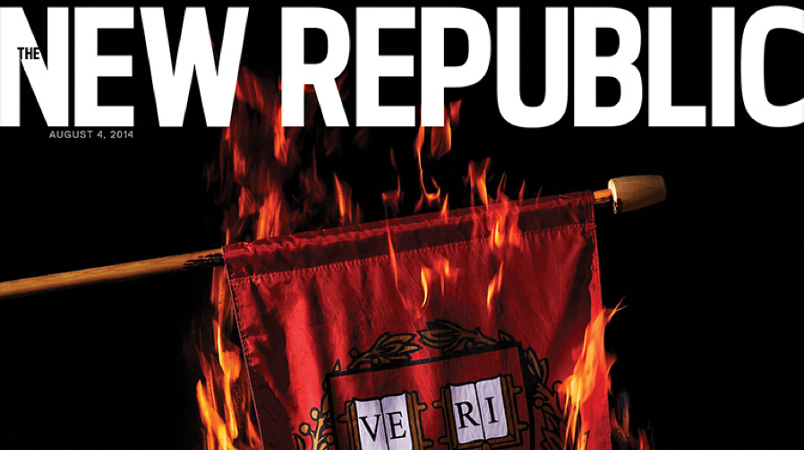A top executive at The New Republic says he anticipated the tension that’s consumed the century-old institution in recent days.
In an open letter published Tuesday, Guy Vidra, who was hired as TNR’s first chief executive officer earlier this year, argued that the difficult media climate necessitates the changes he has in store for the embattled magazine.
I also saw those newsrooms suffer through round after round of layoffs. I saw resources cut. I heard prognostication that the world of publishing was nearing its end. Only one or two of us will remain, many said.
In the last few years, however, we’ve seen publishers old and new defy those predictions. The most exciting part of the successes has been that they’ve been achieved through an array of different strategies—all of which use technology in the service of journalism—leading to more distribution and creative ways of telling stories made possible only through digital means. These publishers are growing and finding new audiences, and, while The New Republic is a very unique place, we can learn from them.
Vidra announced in a memo last week that TNR will be shifting from 20 issues per year to 10 issues and that the magazine will re-locate from Washington, D.C. to New York City. Those sweeping changes coincided with the abrupt resignations from editor-in-chief Franklin Foer and literary editor Leon Wieseltier.
The departure of those two editors prompted a massive exodus from the outlet’s masthead, with several veterans of the magazine strongly criticizing both Vidra and Chris Hughes, the Facebook co-founder who bought TNR in 2012.
Departing staff members have pointed out that the tension between Vidra and Foer had been brewing for months. It came to a head on Thursday, when Foer reportedly learned that he was about to be replaced by Bloomberg Media’s Gabriel Snyder after reading about the rumor on Gawker.
Hughes defended his plans for the magazine, which has suffered significant annual losses, and he even called out the dozens of editors and writers who resigned in protest.
“If you really care about an institution and want to make it strong for the ages, you don’t walk out,” Hughes wrote Sunday in the Washington Post. “You roll up your sleeves, you redouble your commitment to those ideals in a changing world, and you fight. This 100-year-old story is worth fighting for.”
Vidra sounded a similar note in his letter on TNR’s website, writing that he expected his plans to rub some people the wrong way.
“When I decided to take on this role, I knew it would mean that many would not like what was to come—change,” he wrote. “But change does not mean discarding your principles and vision. More than ever, as the media becomes an increasingly crowded and noisy space, there is a hunger for depth of ideas.”







Breaking: A magazine that practically nobody reads is going digital.
“I also saw those newsrooms suffer through round after round of layoffs. I
saw resources cut. I heard prognostication that the world of publishing
was nearing its end. Only one or two of us will remain, many said. What I didn’t see is those fuckers leaving before I had a chance to fire them.”
This article reminds me of the fact that nine-tenths of an iceberg is below the water surface. And it’s not just the New Republic.
Refereed and editor-assisted thought in print will be missed, if that’s the way things are going to have to go.
The tricky thing is that those of us who grew up reading publications like the New Republic will not be affected nearly as much as those later-born people who will never have that experience.
Later-born people’s eyes start to glaze over at character 141.
I had been getting good evaluations in the classroom up until when I left in 2011. I decided to leave when my written (on paper) exercises raised some eyebrows that fall.